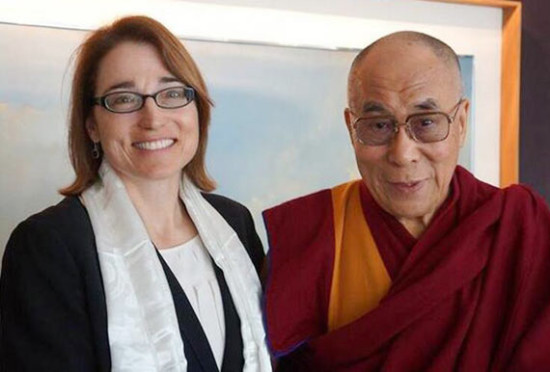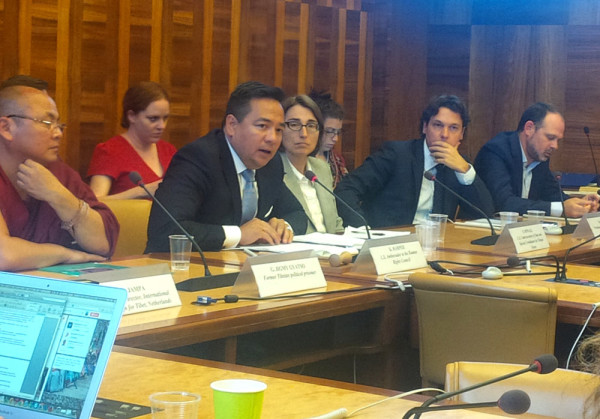Renewed discussions for on the issue of Tibet took place recently at the “Lockdown in Tibet” event as part of the 28th session of the United Nations Human Rights Council in Geneva. Detailed statements on Tibet were made by both a United Kingdom government minister and the United States State Department’s Special Co-ordinator for Tibetan Issues. While both the governments expressed their concern about human rights in Tibet and China’s policies there, neither challenged China’s claim that Tibet is part of China, nor backed the right of the Tibetan people to determine their own political future.
Sarah Sewall, the US Under Secretary for Civilian Security, Democracy, and Human Rights, and Co-ordinator for Tibetan Issues, began her speech with the need for Tibetans to “be able to enjoy their fundamental freedoms enshrined in the Universal Declaration on Human Rights”. She particularly noted the restrictions on religious freedom in Tibet, sayingthat Beijing had “tighten[ed] already strict controls on Tibetans’ freedom of religion, expression, assembly, association, and movement. Chinese authorities have also taken actions to denigrate His Holiness the Dalai Lama”.

US Under Secretary and Special Coordinator for Tibetan Issues, Sarah Sewall with His Holiness the Dalai Lama
Photo: Freetibet.org
Ms Sewall reiterated how the US has always urged the Chinese government to uphold its international commitments to “protect human rights and fundamental freedoms, specifically by ending the harassment, detention, and other mistreatment of individuals who seek to peacefully practice their religion, express their views or seek legal redress”. She went one step further and demanded that the Chinese authorities release Tenzin Delek Rinpoche and other prisoners of conscience and to allow DhondupWangchen to be reunited with his family.
Calling China’s policies in Tibet “unfortunate and counterproductive”, Ms Sewall raised the issue of restrictions on access to Tibet for United Nations representatives, diplomats and journalists. China sometimes allows diplomats and media highly controlled visits to Tibet but refuses free access, giving rise to allegations of skewed evaluations of the situation inside Tibet.Over the last four years itself, 35 of 39 requests made by the American Embassy or Consulates to visit the Tibet Autonomous Region were denied. She urged China to commit to “a timely, predictable visa issuance and credentialing process for foreign journalists, unblock US media websites, and eliminate restrictions on journalists in Tibet and other areas”.
Ms Sewall asserted that the Dalai Lama could be a constructive partner for China in addressing continuing tensions in Tibetan areas. She added that the current Dalai Lama has “repeatedly clarified that he does not seek independence, and instead wants China to help preserve Tibet’s cultural heritage through genuine autonomy within the People’s Republic of China”.
She made note of the criticism meted out to China’s efforts to control the reincarnation of Tibetan monks, especially the case of the 11th Panchen Lama, Gedun Choekyi Nyima, who disappeared after being recognised 26 years ago.
Shesuggested that that China’s position as a “vital strategic partner” for the US and its “growing role in the international community” will ensure that it will “abide by its international commitments with respect to the human rights of people in Tibet”.
In a lengthy debate in the House of Commons in the UK, Hugo Swire, the Junior Minister with responsibility for China, was far less direct than his US counterpart. Mr Swire opened his speech by reaffirming that the UK considers Tibet to be part of the People’s Republic of China. He went on to say that the relationship between the two countries had “never been closer”.
He repeated language commonly used by Chinese state media, saying that “rapid economic growth has raised living standards across China and has improved access to a range of social and economic rights. In Tibet, investment in education, healthcare and employment has led to a doubling in life expectancy since the early 1950s.”
Hugo Swire made no comment about the causes of the numerous self-immolations in Tibet and on the issue of human rights, he referred to specific and long-standing concerns about religious freedom, freedom of expression and “ethnic minority rights”. His only specific call for action, however, was that political prisoners have proper access to medical care.





 Print
Print Email
Email